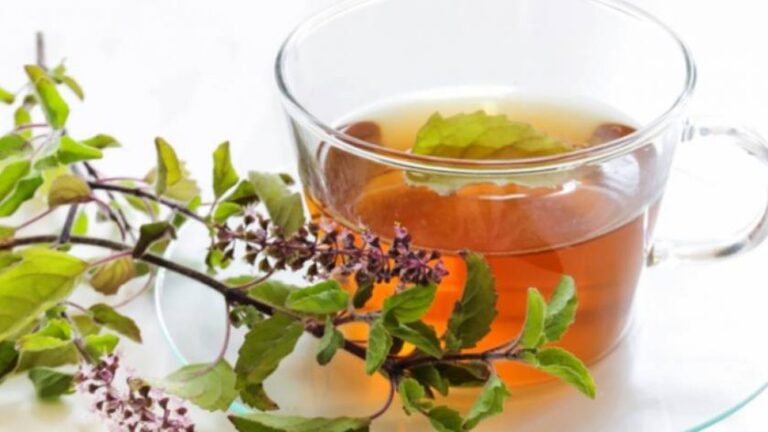As a science of life and the world’s oldest medical system, Ayurveda has a holistic approach to health and disease that focuses on preserving and promoting good health and preventing disease through healthy lifestyle practices. Ayurveda’s use of medicinal and culinary herbs draws upon India’s incredible biodiversity with a variety that is unsurpassed by any medical system; yet, of all the herbs used, none has a status comparable to tulsi or holy basil or Ocimum sanctum. Easy to grow and widely found in the Indian subcontinent, not only is tulsi a revered, holy plant in Hinduism; but it also finds its place in the ancient science of Ayurveda. Tulsi is commonly found in two varieties – the green-coloured Lakshmi tulsi and the purple-hued Krishna tulsi. Apart from the Indian subcontinent, it can also be found in tropical regions of most Southeast Asian countries. Tulsi is worshipped, is offered the gods and is grown in many Hindu households not in vain but for a well-established reason – this humble, inexpensive herb comes loaded with a host of benefits. Tulsi is considered an adaptogenic herb, meaning it can help adapt the body to stress and boost energy. In alternative medicine, tulsi is typically used for anxiety, stress, and fatigue, and may be used in herbal formulations to help treat asthma, bronchitis, colds, and the flu.

Tulsi is perhaps one of the best examples of Ayurveda’s holistic lifestyle approach to health. Tulsi tastes hot and bitter and is said to penetrate the deep tissues, and dry tissue secretions and normalize Kapha and Vata. Daily consumption of tulsi is said to prevent disease, promote general health, well-being and longevity and assist in dealing with the stresses of daily life. Tulsi is also credited with giving lustre to the complexion, sweetness to the voice and fostering beauty, intelligence, stamina and a calm emotional disposition.
Laboratory studies have shown that tulsi protects against toxic chemical-induced injury by increasing the body’s levels of anti-oxidant molecules such as glutathione and enhancing the activity of antioxidant enzymes such as superoxide dismutase and catalase, which protect cellular organelles and membranes by mopping up damaging free radicals caused by lack of oxygen and other toxic agents. Here are some benefits of Tulsi leaves that can lead a healthier life all around.
Stress or Anxiety
Nowadays, stress is very common in our day-to-day life. Research suggests tulsi may relieve anxiety and improve moods. Tulsi contains compounds Ocimumosides A and B. These compounds reduce stress and balance the neurotransmitters serotonin and dopamine in the brain. Several animals and laboratories have shown their effectiveness, but few clinical trials have been done.

In a 2008 study of 35 adults with generalized anxiety disorder, researchers found that taking tulsi in capsule form twice daily for 60 days significantly reduced levels of anxiety.1 Subjects also reported feeling lower levels of stress and depression. A 2015 placebo-controlled trial of healthy adults found tulsi may ease stress and improve cognitive functions like reaction time.
Physical stress
Prolonged physical exertion, physical restraint, exposure to cold and excessive noise disturb homeostasis by inducing physiological and metabolic stress. When the capacity to adapt to these stressors is exceeded, maladaptation occurs resulting in damage to biochemical pathways, organ function and health. Through enhancing various cellular and physiological adaptive functions, adaptogenic herbs such as tulsi are able to protect against this damage.
Studies using forced swimming, restraint and cold-exposure stress in laboratory animals have shown that tulsi enhances aerobic metabolism, improves swimming time, reduces oxidative tissue damage and normalizes many physiological and biochemical parameters caused by physical stressors.
Similarly, experimental studies have shown that tulsi helps reduce the effects of acute and chronic noise-induced stress in experimental animals, with the enhancement of neurotransmitter and oxidative stress levels in discrete brain regions along with improved immune, ECG and corticosteroid responses.

Natural Immunity Booster
Tulsi is rich in Vitamin C and zinc. It thus acts as a natural immunity booster and keeps infections at bay. It has immense anti-bacterial, anti-viral and anti-fungal properties which protect us from a variety of infections. Tulsi leaves extract increases the T helper cells and natural killer cells activity, boosting the immune system. Tulsi leaves work to wonder in building immunity. It maintains our metabolism and protects us from any bacterial and viral infections like colds, fevers, flu, etc.

Reduces Fever and Pain
Tulsi is an age-old ingredient for treating fever. It is one of the prime ingredients in the formulation of various ayurvedic medicines & home remedies. Tulsi has anti-bacterial and anti-viral properties which help to fight infections, thus reducing fever. The fresh juice of Tulsi taken with black pepper powder cures periodic fevers. Tulsi leaves boiled with powdered cardamom in half a liter of water and mixed with sugar and milk, are also effective in reducing temperature. Eugenol, a terpene with pain-relieving properties found in Tulsi reduces aches in the body.

Good for Heart Health

Tulsi has a profound effect on the treatment and prevention of cardiovascular diseases by means of lowering blood lipid content, suppressing ischemia and stroke, reducing hypertension, and also due to its higher antioxidant properties.

